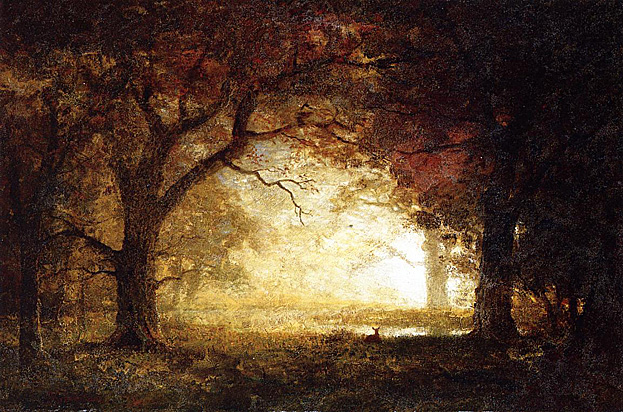One of my students, a girl I care about and admire tremendously, suddenly and unexpectedly lost her father this past week. She took my Introduction to Literature course last semester, in which we read The Selected Poems of Wendell Berry, and I can think of few poets more consoling on the subject of death. I therefore sent her his poem “Testament.”
Berry is, as Robert Burns was, a “ploughman poet,” one who farms as well as writes. As a result, he is familiar with scenes of life and death and not cut off from the land. I find bracing his matter-of-fact way of talking about the mystery of death as I mourn my own father. I pray that Elena finds similar comfort in his words:
Testament
By Wendell Berry
And now to the Abyss I pass
Of that Unfathomable Grass…
1.
Dear relatives and friends, when my last breath
Grows large and free in air, don’t call it death —
A word to enrich the undertaker and inspire
His surly art of imitating life; conspire
Against him. Say that my body cannot now
Be improved upon; it has no fault to show
To the sly cosmetician. Say that my flesh
Has a perfect compliance with the grass
Truer than any it could have striven for.
You will recognize the earth in me, as before
I wished to know it in myself: my earth
That has been my care and faithful charge from birth,
And toward which all my sorrows were surely bound,
And all my hopes. Say that I have found
A good solution, and am on my way
To the roots. And say I have left my native clay
At last, to be a traveler; that too will be so.
Traveler to where? Say you don’t know.
2.
But do not let your ignorance
Of my spirit’s whereabouts dismay
You, or overwhelm your thoughts.
Be careful not to say
Anything too final. Whatever
Is unsure is possible, and life is bigger
Than flesh. Beyond reach of thought
Let imagination figure
Your hope. That will be generous
To me and to yourselves. Why settle
For some know-it-all’s despair
When the dead
may dance to the fiddle
Hereafter, for all anybody knows?
And remember that the Heavenly soil
Need not be too rich to please
One who was happy in Port Royal.
I may be already heading back,
A new and better man, toward
That town. The thought’s unreasonable,
But so is life, thank the Lord!
3.
So treat me, even dead,
As a man who has a place
To go, and something to do.
Don’t muck up my face
With wax and powder and rouge
As one would prettify
An unalterable fact
To give bitterness the lie.
Admit the native earth
My body is and will be,
Admit its freedom and
Its changeability.
Dress me in the clothes
I wore in the day’s round.
Lay me in a wooden box.
Put the box in the ground.
4.
Beneath this stone a Berry is planted
In his home land, as he wanted.
He has come to the gathering of his kin,
Among whom some were worthy men,
Farmers mostly, who lived by hand,
But one was a cobbler from Ireland,
Another played the eternal fool
By riding on a circus mule
To be remembered in grateful laughter
Longer than the rest. After
Doing what they had to do
They are at ease here. Let all of you
Who yet for pain find force and voice
Look on their peace, and rejoice.
In my note accompanying the poem, I shared with Elena an insight that I came to when I lost my oldest son. Grieving, I told her, is a journey and one needs to open oneself to whatever it offers. One can’t predict where the journey will take you, I said, but if you follow the lead of your feelings rather than impose expectations upon the process, healing will occur. I’m struck that, in “Testament,” Berry describes his journey of death in similar terms. “Traveler to where?” he asks and then immediately answers, “Say you don’t know.”
Along the same lines, I also like Berry’s injunction not to be too confident in asserting that there’s nothing after death. We can’t confidently assert that we’ll go out like a candle (a la Alice in the White King’s Dream) any more than we can confidently assert that there is an afterlife. For Berry, the very uncertainty does more justice to the mystery of death than any flat declarative statement. It’s best to let “imagination figure [our] hope:
Be careful not to say
Anything too final. Whatever
Is unsure is possible, and life is bigger
Than flesh. Beyond reach of thought
Let imagination figure
Your hope. That will be generous
To me and to yourselves. Why settle
For some know-it-all’s despair
When the dead
may dance to the fiddle
Hereafter, for all anybody knows?
I sense that, in his final couplet, Berry is echoing T. S. Eliot in The Waste Land, only with a more positive spin. Eliot means to sober us up with his comments on Phlebas, the drowned Phoenician: “O you who turn the wheel and look to windward, /Consider Phlebas, who was once handsome and tall as you.” Berry, by contrast, says that we will instead find peace if we look at the dead, in this case his dead ancestors. “Let all of you who yet for pain find force and voice,” he counsels, “look on their peace, and rejoice.”
To apply Hamlet’s words, “’Tis a consummation devoutly to be wished.”



One Trackback
[…] our remains becoming part of the cycle of life (as in his poem “Testament,” which I comment on here). The sweet bird that Shelley mentions is the nightingale to which Keats wrote his famous ode. […]